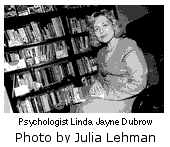
|
The City Paper
May 29 - June 5, 1997
"City
Beat"
Cult
Busters
By Jennifer
Rauch
"We don't like the word 'deprogramming,"
says clinical psychologist Linda Jayne Dubrow. "Brainwashing
and kidnapping are out, too."
These words imply something involuntary,
says Dubrow, co-founder of the Re-Entry Therapy, Information
and Referral Network (RETIRN), which helps cult members exit
groups and re-enter society at large. "We don't see
ourselves as deprogrammers, but as mental health
professionals who can offer specialized counseling," she
says.
|
Dubrow, who will speak Friday at a Philadelphia
conference sponsored by cult awareness organization AFF, formed
RETIRN with Steve K. D. Eichel (who once infiltrated the Moonies, a
group known for holding mass marriage ceremonies in Madison Square
Garden, as an undergraduate psychology project) to counsel people who
have lost loved ones to cults and to help those in cultic groups
decide when they're ready to leave -- voluntarily, of course -- as
well as how to do so.
RETIRNers Eichel and Steve Eisenberg, a
Hare-Krishna-turned-"thought-reform consultant," will also
participate in the event.
Thought-reform consultants -- or, to sound less
Orwellian, exit counselors -- play the role once portrayed as "some
guys in a van" in this made-for-TV scenario: some guys in a van
kidnap someone who's been brainwashed by a cult, lockthemselves in a
hotel room and proceed to deprogram the subject by performing a good
cop-bad cop routine until the person snaps out of it.
Today's thought-reform consultants consider the
previous methods unethical. "We've worked long and hard to establish
ethics and principles like respect, confidentiality and
responsibility," says one former member of Transcendental Meditation
(TM) who is now a Philadelphia thought-reform consultant.
The professional spirit of cult counseling in the
1990s is also due to the efforts of AFF, an organization of scholars,
psychiatrists, psychologists and counselors who conduct research on
cult involvement and provide information about cultic and support
groups to the public and media. AFF stands alone in this field since
its well-known predecessor, the grassroots Cult Awareness Network,
declared bankruptcy last year after losing a civil rights lawsuit
filed by a prominent, well-financed cult.
"There's nothing wrong with cults per se," says
the thought-reform consultant, who spoke on the condition of
anonymity. "It's an academic term that refers to the way a group is
managed, and that isn't synonymous with mind control.There are cults
that don't use mind control and there are non-cultic groups that do.
AFF offers objective information, which is something the cults
themselves don't always do."
That information is in great demand, says the
ex-TMer, also the editor of AFF's newsletter and Web site. So far
this month 122,000 people have accessed the http://www.csj.org
site, he says, and the Heaven's Gate mass suicide generated more than
double that number of hits last month.
Although AFF studies dozens of large and small
groups -- such as Hare Krishna, EST, Free John, Heaven's Gate, Amway,
Lyndon LaRouche, Eckankar -- it distinguishes ordinary cults from
destructive ones. Destructive elements, says the ex-TMer, include a
pyramid structure, deception in recruitment, a hidden agenda, and
thought-reform processes that bind people together and impair their
critical thinking skills.
As an illustration, he compares the Catholic
church with Transcendental Meditation. "Catholics say, this is what
we believe: there was a guy named Jesus who was the son of God, who
died on the cross for our sins," he says. "That might be a tall order
for some to believe, but it's up front and the belief doesn't change
as you rise through the organization."
"In TM, though, there's a lack of informed
consent," he continues. "When you join, they say it's about living in
tune with the laws of nature. If I drop this pen, it will fall to the
floor. That's the law of gravity. But at the upper levels, they teach
you that there's a being that runs gravity, that runs the wind, and
so on. TM tells some of its members that the world is being run by
evil beings because the gods who make the world a better place are
asleep, and that humans must wake them up by feeding them soma, which
is released by meditating."
While some of the aforementioned groups do have a
presence in Philadelphia, this area is not a hotbed of cult activity,
Dubrow says. Not until this weekend, anyway, when cult specialists,
ex-members and their families from all over the nation and the world
gather at the Holiday Inn, Philadelphia Stadium for the AFF
conference.
Margaret Thaler Singer, the grande dame of cults
and author of Cults in Our Midst and Crazy Therapies,
will speak at a free public program on Friday. A professor of
clinical psychology at UC Berkeley who has worked with people
involved in the Jonestown massacre and served as Patty Hearst's
psychologist, Singer has developed many contemporary theories on
cultic influence and treatment.
Dubrow will join a panel discussion looking at the
abusive family environment as a cult. "In my clinical work, I noticed
similarities between domesticviolence and cults," she says. "Women in
abusive relationships are subject to undue influence or coercive
persuasion. Why else do they stay?"


